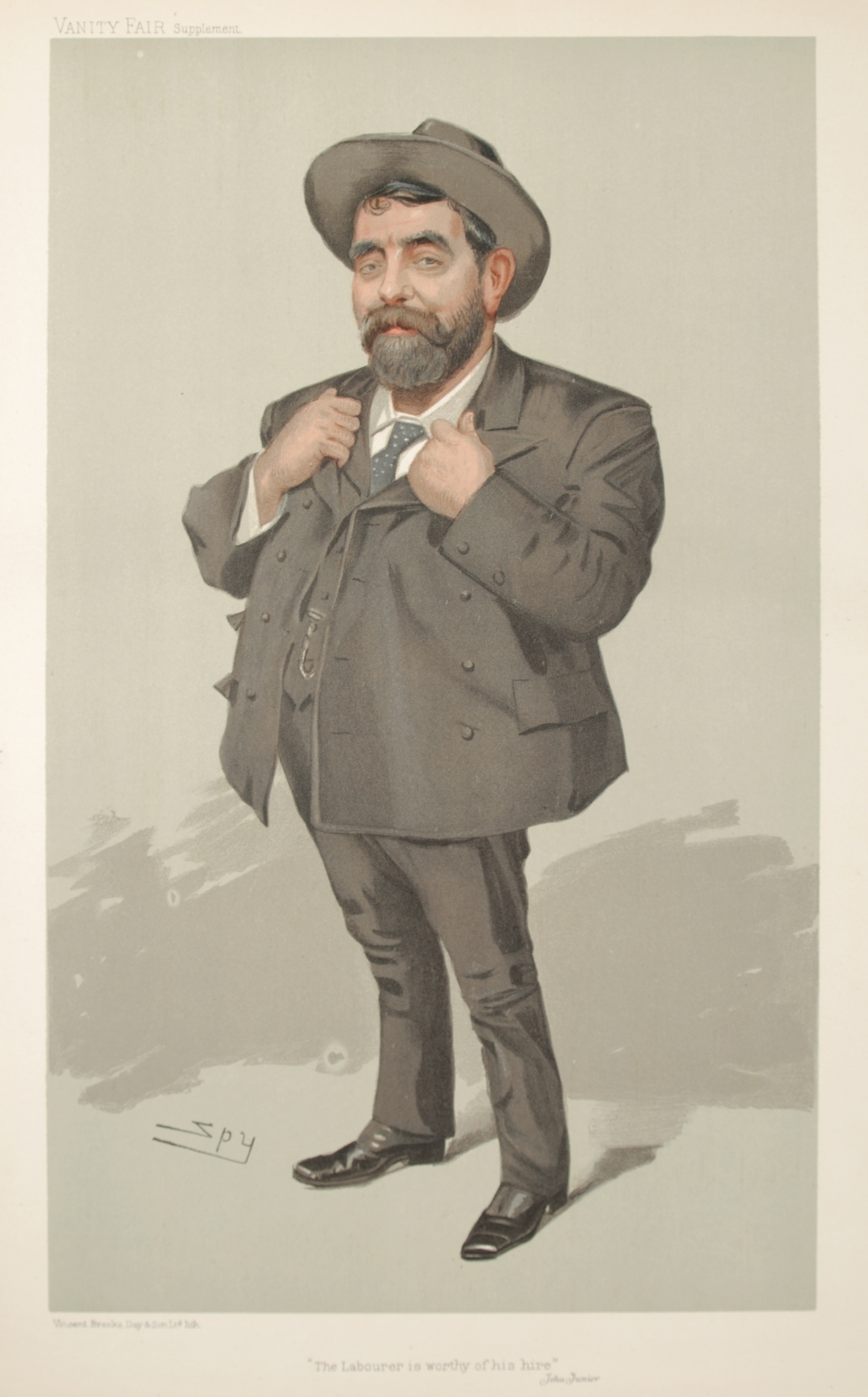 |
| Will Crooks grave in Tower Hamlets Cemetery Park http://www.panoramio.com/photo/70801819 |
Will Crooks: A celebration. Tuesday
29th May, 6:30pm - 8:30pm at St. Matthias Community Centre, Poplar High
Street
This event will celebrate the 160th anniversary of the birth of
Will Crooks - Trade Unionist, the fourth Labour Member of Parliament and first
Labour Mayor of Poplar.
Speakers will includ
Nick Raynsford, Member of Parliament for Greenwich and Woolwich and David Edgar,
councillor for Limehouse.
RSVP to: ramona.losip@canarywharf.com or
020 7418 2462.
 |
| "The Labourer worth his Hire" Vanity Fair 6th April 1905 |
Wkkipedia say
William (Will) Crooks (6 April 1852 – 5 June 1921) was a noted trade unionist and politicianfrom Poplar, London, and a member of the Fabian Society. He is particularly remembered for his campaigning work against poverty and inequality.
[edit]Biography
Born in Shirbutt Street, Poplar, Crooks was the third son of a ship's stoker, George Crooks, who lost his arm in an accident when Crooks was three years old. His mother, Caroline Elizabeth (née Coates), then supported the family by working as a seamstress, but money was scarce and five of the children were temporarily forced to enter Poplar workhouse in 1861. This experience had a profound influence on Crooks' views on poverty.
Educated at a local Poor law school, Crooks worked initially as a grocer's errand boy, then a blacksmith's labourer and then as an apprentice cooper. A keen reader, Crooks learned about reformers such as Richard Cobden and John Bright, and was asked by his fellow workers to speak out about their working conditions. Consequently, he was sacked for being a political agitator. He remained a member of the Coopers Union from 1867 until his death in 1921.
After a short spell working in Liverpool, Crooks returned to London and found work in the docks. He also began to give political lectures, and his speaking abilities proved helpful in raising funds for 10,000 striking dockers in the 1889 London Dock Strike.
Earlier that year, Crooks, a candidate for the Progressive Party, successfully stood for election to the London County Council, and joined Sidney Webb and other labour movement leaders in the LCC. He also became the first working-class member, and later chairman, of the Poplar Board of Guardians. With support from friend and fellow member George Lansbury, Crooks set about reforming the local workhouse, creating a model for other Poor Law authorities.
A prominent local politician, he helped bring about many local improvements. On 3 August 1895, Crooks formally opened Island Gardens, a park at the south end of the Isle of Dogs, opposite Greenwich Hospital. He also campaigned for the first Blackwall Tunnel, and as Chairman of the LCC Bridges Committee in 1898, he helped provide the Greenwich and Woolwich foot tunnels (completed in 1902 and 1912 respectively).
In 1901 Crooks became the first Labour mayor of Poplar, and two years later was elected to Parliament as MP for Woolwich. This success was the result of a pact between the Labour Representation Committee and the Liberal Party, which wrested the seat away from theConservative Party). At the time, he was only the fourth Labour MP (preceded by James Keir Hardie, Richard Bell and David Shackleton; Arthur Henderson followed later in 1903).As an MP, he retained his working-class roots and contacts, campaigned hard for workers'pensions, supported reforms to limit the powers of the House of Lords, and supported Balfour’s Unemployment Bill in 1905. Re-elected in 1906, he supported the reforming Liberal governments of Campbell-Bannerman (1906–1908) and Asquith (1908–1910).
In 1901 Crooks became the first Labour mayor of Poplar, and two years later was elected toParliament as MP for Woolwich. This success was the result of a pact between the Labour Representation Committee and the Liberal Party, which wrested the seat away from theConservative Party). At the time, he was only the fourth Labour MP (preceded by James Keir Hardie, Richard Bell and David Shackleton; Arthur Henderson followed later in 1903).
Crooks lost his seat in Parliament at the January 1910 general election, but was re-elected at the December 1910 general election, and remained an MP until ill-health forced his retirement in February 1921. He died in the London Hospital, Whitechapel four months later, and was buried in Tower Hamlets Cemetery.
In 1930, one of the Woolwich Ferry paddle-steamers was named in his memory (taken out of service in 1963). A council housing estate in his native Poplar still bears his name, as does a road in Eltham, just south of Woolwich.
[edit]External links
| Wikimedia Commons has media related to: William Crooks (1852-1921) |
- Hansard 1803–2005: contributions in Parliament by Will Crooks
I hear the event had about 70 people attend. It's nice to know his memory is being kept alive. He did so many great things for the working class people of Britain. There's a book that has been recently released on his life and achievements too. It's called 'Where there's a Will, there's a way: The remarkable life story of Will Crooks MP'. You can see more on the authors website at: http://www.jimsbooksite.com
ReplyDelete